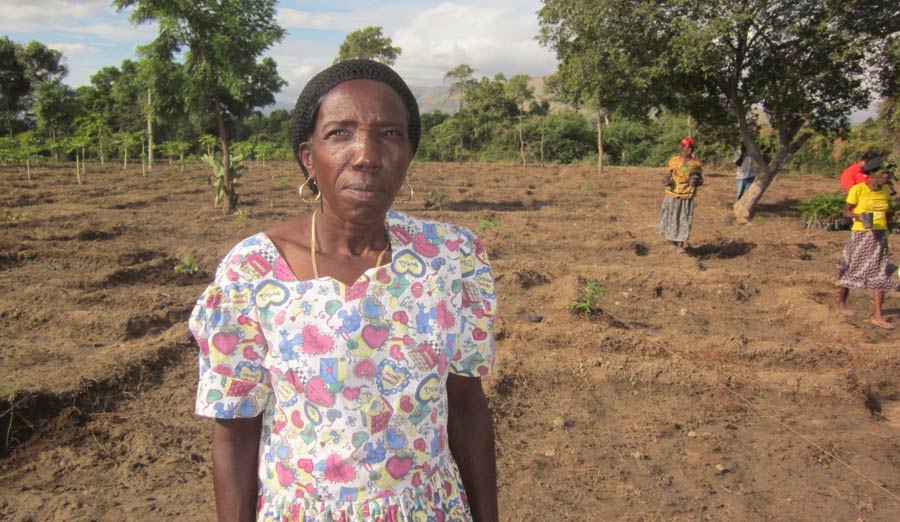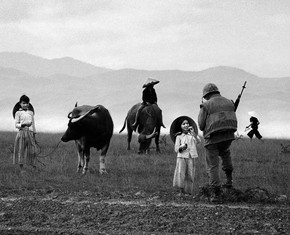The views expressed in our content reflect individual perspectives and do not represent the authoritative views of the Baha'i Faith.
Having realized that a third of humanity depends on and are engaged in smallholder farming, a question formed in my mind: if we are one human family cohabiting one planet, how can a third of that family seem so invisible?
I don’t know about you, but spending most of my professional career in humanitarian and environmental issues, smallholder farmers were never more than a footnote in my worldview until a few years ago.
I think the reason can be traced back to the late 1950s and early 60s. People held a widespread belief around that time that global food production was not expanding fast enough to keep pace with population growth, and that by the 1990s we would be facing worldwide famine. We forget now what a huge issue this became during that period.
To stave off widespread famine, the world responded by promoting the industrialization of agriculture.
We applied massive resources to the research and development of new technologies for growing monoculture hybrid crops on large tracts of land that required mechanization along with chemical fertilizers, herbicides and pesticides to produce higher and higher yields.
This took place on a massive scale in the developed, industrialized countries of the north, while in developing nations the same process came to be known as the Green Revolution. Sure enough, by the late 1960s a huge increase in agricultural production happened worldwide—and no question about it, we averted what could have been a major global disaster.
However, the environmental cost proved enormous. Today industrial-scale agriculture continues to be a major contributing factor driving climate change and reducing biodiversity, among other things. In our need to feed humanity, we forgot the essential, organic truth of interdependence, expressed here in the Baha’i teachings:
… harmony and interdependence characterize the kingdoms of phenomenal life … The elements and lower organisms are synchronized in the great plan of life. Shall man, infinitely above them in degree, be antagonistic and a destroyer of that perfection? God forbid such a condition!
From the fellowship and commingling of the elemental atoms life results. In their harmony and blending there is ever newness of existence. … All the elements are in harmony and equilibrium. A slight disturbance and discord among them … A physical clash, a little quarreling among the elements as it were, and a violent cataclysm of nature results. This happens in the mineral kingdom. … How great the attendant catastrophe, especially when we realize that man is endowed by God with mind and intellect. – Abdu’l-Baha, The Promulgation of Universal Peace, pp. 350-351.
This massive industrialization of agriculture reinforced the rise, at around the same time, of the post-Marshall Plan version of development assistance—the rich countries of the north helping the poorer countries of the south to improve their economies. Countries like Canada, the United States, the United Kingdom and others began to provide substantial funds to build bridges, schools and roads in poor countries throughout Africa, Asia and South America.
I’m not suggesting this assistance was pure unadulterated philanthropy, because it was not, but one key condition of this support was that the recipient developing countries had to stop supporting domestic agriculture—smallholder farms. The exception: industrialized farms geared to export food to wealthier countries. As a part of that process, developing countries were encouraged to become net importers of food—encouraged, in particular, to import the cereal grains now being grown on industrial-scale farms beyond their borders.
Take a country like Haiti. Up to the mid-80s they were almost entirely self-sufficient in growing their own food. Now Haiti imports more than half of all its food.

Each country has a slightly different scenario, but the net result of 60 years of enforced policies of not supporting smallholder domestic agriculture has resulted in many developing nations being dependent on food imports—and taking on huge debt as a result. Not to mention that industrialized agriculture has led to 75% of what the world now eats being based on just 12 plants and five animal species.
By general consensus, smallholders have long been seen as outright obstacles to progress. They have received little agricultural training, and have been almost entirely cut off from research into improving small-scale farming. Given very limited access to credit services, and cut off from most forms of support that the state, financial institutions and research centers provide to industrial agriculture, excluded from trade agreements, never at the table for discussions on tariffs or embargoes, they have suffered enormously.
In the process, the cloak of invisibility gradually descended on one-third of the world’s population.
But they didn’t disappear. China has 189 million smallholder farms; India 98 million; Russia 18 million; 33 million in Sub-Saharan Africa; and 3 million in Brazil. Haiti has half a million, with a total population of only 11 million people. With so much pressure to go away, why are these smallholders still here?
I put it to you that it’s because small-scale family farming is central to the human condition. This direct connection with the Earth and growing food is inseparable from who we are as a species. Those farmers have fed themselves—and us—across the entirety of human existence. They have learned from the Earth itself, assimilated its wisdom generation after generation, and been sustained by its bounty. They, more than just about anyone, know the spiritual principle of interdependence—and that our survival as a species hinges on understanding and implementing it in a sustainable way.
In the next essay in this series, we’ll look at ways to address food insecurity, climate change and gender equality—all at once.
This essay is adapted from a talk by Hugh Locke to the Parliament of the World’s Religions that took place in Toronto in November, 2018.
















Comments
Sign in or create an account
Continue with Googleor